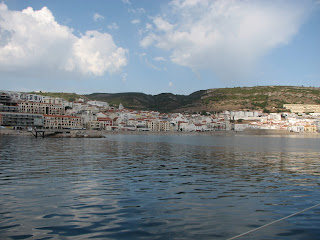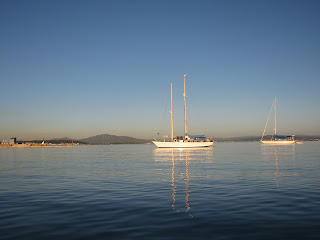This is going to be a different kind of post, and one which if you are just following the story on a mobile phone, you might like to skip; but I thought it time to spell out the background and aims of this blog, so if you can, make yourself comfortable for a serious bit of a read; I wrote it while Anna M was at rest in Horseshoe Bay.
I grew up in Hastings, with a view over the Channel, fading to an empty horizon. However, I was fortunate enough to discover that if one sailed out into that apparent emptiness, behold, as our familiar England receded, another country appeared; here things were different, and they spoke another language. Thus France became an invisible presence in my life, and among other things, I learnt that the fact of not seeing something by no means indicates that it is not there. As Lewis Carroll had it:-
‘What matters it how far we go?’ his scaly friend replied.
There is another shore, you know, upon the other side.
The further off from England the nearer is to France-
Then turn not pale, beloved snail, but come and join the dance.
Will you, wo’n’t you, will you, wo’n’t you, will you join the dance?
Will you, wo’n’t you, will you, wo’n’t you, wo’n’t you join the dance?
I gradually perceived that in fact the human race is haunted by invisible presences, and what's more, beyond or perhaps even closer than them all there lurks a Biggy. I grew in the conviction that the Catholic faith was entirely reasonable, and to believe that reality was indeed as revealed in the story, church and person of Jesus Christ.
However, it turned out that it was frequently easier and more comfortable to ignore it and pretend to oneself that this awe-inspiring reality was but a dream. European history turned above all on efforts to make images, to fabricate worlds that men could live with (while the women whom they were trying to please tended to criticise, not being quite satisfied with anything short of the Biggy), and on the tension between the two; the castles of ego wherein we play at being 'king of the castle', and the cathedrals whereby we at least try to express the aspiration to transcend ourselves in Christ.
We like of course to have it both ways: we make a castle of our nation for instance and also try to make out that it is actually The Kingdom; but There no earthly passport avails at the gates! Man's ways are not God's ways; He continually brings forth truth by revealing the falsehood of our propositions. Our God is a humourist, who can turn even our tragedies into comedies. The castles crumble, and even the cathedrals, but through Christ's cross, our defeats may be turned into victories. Even men's vilest castles represent some kind of fumbling effort to realise the Kingdom, which fact, discovered, enables us even to forgive the knaves who make them.
Our Lady is Mother of the Church, and so essential to Catholicism, because she firmly points beyond any attempt to bring forth the Kingdom by way of an earthly paternity. She is a much more radical feminist than those who sadly just want to be fathers themselves, and play 'king of the castle' with the best of them! Like the socialists with whom they associate, the impulse from which they start is fine, but they go wrong when they refuse to kneel to the Cross.
Thus Jeremy Corbyn, admirable and honest and refreshing though he may be, will only join the long line of duped or disastrous socialists unless he really attends to reality and gets back to the roots of that impulse. In Ireland, a retiring senior Labour minister has just illustrated fairly well, in a speech to the Party faithful, how with all good-will, they go wrong: ‘We have been a lonely tribe of adventurers, pioneers and visionaries who said we will transform this country in a way that it was never transformed before…. We have brought this country into the 21st century… when they never gave us a mandate to do it within a vote that is beyond 19pc!’
These are the guys who like to lecture us Catholics about democracy! It smells of hypocrisy to me. I do not say that one does not need leadership within democracy, but a real democrat will be trying to bring out and build on the sense of responsibility in ordinary people, and to truly empower them, not foisting the latest progressive fashion on them, let alone buying their votes when they get a chance because the price of oil happens to be low.
All this is not to say that our earthly efforts are entirely vain, as Buddhists apparently maintain. As boyish games grow muscles for greater undertakings, so in social efforts and in art and projects of all kinds, we can begin to transcend our ego and to participate in the Kingdom; indeed it may even be given to us to help build it, if only, like Mary, we firstly listen to the quiet voice which tells us how to do so, the angelic voice both within and forever beyond.
This listening involves being fully present, like Mary at the foot of the Cross, and therefore true to ourselves, while attending to every breath of the wind, and all the 'minute particulars' before us. That sailor is quickly punished who fails to pay attention to them, while it is no use claiming to praise and honour God if we do not firstly admire and appreciate and respect His creation, all the while listening, and then do our part, however small, to respond and care for it!
A journey is involved, from slavery to the Promised Land; a dance, it has been called. It involves both difficulty and consolation; my favourite image is that of sailing the sea, in a sailing boat of course, not some great machine. From that first stretching across the Channel, sailing has extended my terrestrial home to the 'Gannetsway', where the gannets fly from Scotland to the south of the Iberian Peninsula.
It is an antidote to a way of living that, unheeding of the angelic voice, has become too abstract, too heady and compartmentalized, which has lost its sense of history and even, for all its zooming about, its sense of place; which frequently no longer appears even to have much of a future and certainly spends most of its time in a fog, with little idea of where it may be going!
So in faith we have to 'pick up the stitches' of our history and geography, our languages and arts. My 'home country' involves (particularly but not exclusively) the interplay of the European peoples of the Eastern Atlantic, Celtic, British, Iberian.... If here, after all the centuries of strife, we could learn to sing and dance together, what a gift it would be to the world!
Meanwhile, I seek to get to know and to celebrate this Gannetsway, mile by mile, with difficulty and delay and much fun, in a wooden sailing boat which is ageing like myself, and only stays afloat by the Grace of God!
Joe Aston, September, 2015.

 and Fiona put up with staying out the next night, as we powered down the Portuguese coast at up to 8 knots. The breeze died the next morning (24th September), so we went into Nazare rather than spend a second night out.
and Fiona put up with staying out the next night, as we powered down the Portuguese coast at up to 8 knots. The breeze died the next morning (24th September), so we went into Nazare rather than spend a second night out. It was gentle sailing or motoring all the way round Cape St Vincent, anchoring for a night at Sines and then at Sagres-
It was gentle sailing or motoring all the way round Cape St Vincent, anchoring for a night at Sines and then at Sagres-  A very sedate sail at 2 knots or less took us on to Lagos, for our usual date with Tony Simmonds at the Adega Marina. Yummy!
A very sedate sail at 2 knots or less took us on to Lagos, for our usual date with Tony Simmonds at the Adega Marina. Yummy!


















































